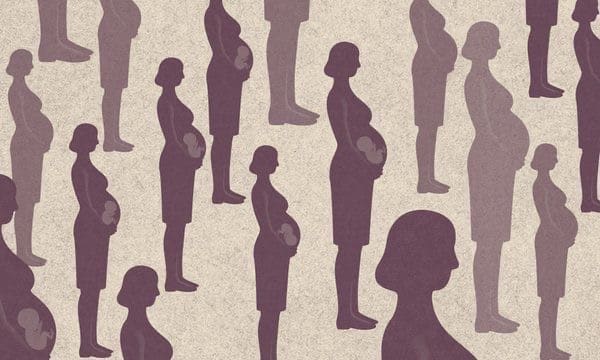The joy of motherhood begins with coming back home alive with you and your bundle of joy in good condition. Sadly, this has not always been the case with expectant mothers. Over 59,000 women die during childbirth each year in Nigeria alone.
There is no doubt that this is not good news. Stick with me as I analyze the causes of these deaths and what can be done to reduce maternal mortality rate in our country, Nigeria.
Table of Contents
What is Maternal Mortality?
Maternal mortality occurs when a woman dies due to complications from childbirth, pregnancy, and other contributing factors.
Maternal Mortality Causes
Maternal mortality is due to several reasons, some of which are listed below;
-
Cryptic pregnancy
During pregnancy, there’s an absence of menstruation, continuous belly bump growth, and body size increase. But this is not the case with cryptic pregnancy.
Cryptic pregnancy is when a woman does not know that she is pregnant and might not find out till the last stage of pregnancy or even till the delivery day. As fascinating as this may seem, it’s very risky, as individuals with such conditions are totally in the dark and will not take the necessary precautions a pregnant woman should take.
Precautions like going for regular medical check ups, abstaining from alcohol, refraining from harmful exercises, bad dieting etc. This, in some cases, has led to both the death of the mother and fetus.
-
Excessive blood loss
This often occurs after delivery, when the muscle of the uterus does not tighten enough, and the blood vessels bleed freely (postpartum hemorrhage).
-
Infection
Infection during pregnancy can lead to death. As sometimes, the body’s response to infection causes injury to tissues and organs, which most times leads to death or abortion of the growing fetus.
-
High blood pressure
When the blood pressure goes up during pregnancy, it places an extra burden on the heart and kidneys, which can lead to heart or kidney disease. Pregnant women with chronic hypertension have a higher risk of death or premature delivery.
-
Obstructed labor
As we all know, labor prepares the body to deliver the baby. When labor is obstructed, it leads to dehydration, exhaustion, and even infection. Women in communities with poor access to obstetric care are at higher risk of losing their lives.
-
Malaria
A pregnant woman should protect herself from mosquitoes. Malaria during pregnancy hurts both mother and fetus. It can lead to maternal anemia (few red blood cells, iron deficiency, vitamin B-12 deficiency and folate deficiency) or fetal loss.
Read also: Where’s the Line for Sexual Harassment? A Woman’s Perspective.
Non-Medical Factors Contributing to Maternal Mortality Rates In Nigeria
-
Inadequate manpower
So many hospitals in rural Nigeria are suffering from inadequate workforce. There are too many patients to attend to and few qualified doctors. The few available doctors are compelled to multitask, and as a result, they offer low-quality attention to their patients, while some patients are not even attended to.
The Nigerian doctor-to-population ratio is one doctor to 8000 people, instead of one doctor to 600 people as recommended by WHO (World Health Organization). When expectant mothers do not receive quality care, their chances of surviving will be low.
-
Delay in seeking help
Some cases of maternal mortality are as a result of seeking help too late. Every pregnant woman should understand her body system and be sure not to ignore any unusual occurrences, no matter how small these occurrences are.
The earlier a problem is spotted, the easier it is for it to be tackled; better safe than sorry.
-
Lack of essential equipment/medications
In addition to the lack of qualified doctors, the lack of essential equipment/medication is a leading factor in maternal mortality rates in Nigeria today.
So many Nigerian hospitals today lack essential equipment and medications; these equipment have not been provided at the government hospitals and health centers, and most private hospitals can’t afford to buy them.
-
Illiteracy
Many women have lost their lives during pregnancy or childbirth due to a lack of knowledge on how to protect themselves and that of the growing fetus. These women are involved in harmful practices like chewing tobacco, drinking alcohol, urinating in dirty environments, eating unprotected foods, etc.
-
Economic status
Nigeria does not have a health insurance system, and even the few free health centers do not have enough medications and equipment. Women with low-income levels are at a higher risk of death as money is needed to provide good food and quality medications.
Because of the economic status of Nigeria, most women can’t afford their basic needs not to talk about getting quality health care while pregnant.
Read also: Financial planning for Nigerian Women: Building Wealth and Security.
-
Cultural barriers
Cultural barriers have contributed a great deal to maternal mortality in Nigeria. The majority of the decisions people make when it comes to health care are influenced by their culture.
Some women have lost their lives because it’s against their husband’s culture to give birth through cesarean section, even after the doctor confirmed that it is the safest option.
Some have lost their lives because their culture expects new mothers to sit in extremely hot water and consume spicy foods, even though the doctor has warned them not to do so because of some medical complications while giving birth.
Join our WhatsApp community to access opportunities and resources to aid your personal and career growth.
What can be Done to Reduce the Maternal Mortality Rates in Nigeria?
-
Health education
Our women, especially those from the northern region, should be adequately educated about their health. The government should organize educational campaigns and ensure that these illiterate women in Nigeria are enlightened on how best to care for themselves while pregnant.
-
Essential obstetric care
Our public hospitals and health centers should be equipped with essential tools and medications to ensure the safe delivery of expectant mothers.
Read also: 10 Best Practices to Stay Healthy While Working From Home in Nigeria.
-
Postpartum care
Mothers should not be neglected after delivery; they should be adequately cared for by qualified nurses; family members are not to administer unauthorized medications, local or orthodox.
-
Adequate workforce
The Nigerian government should make the country conducive enough for qualified doctors; many of our competent doctors are overseas, hence the inadequate workforce.
Conclusion
Statistics show that it will take Nigeria up to 20 years to meet the WHO standards of one doctor to 600 patients. Still, the little effort we make to help our expectant mothers will go a long way in curtailing the maternal mortality rates in Nigeria.
Subscribe to our newsletter for more insightful posts like this.
Edited by Oluwanifemi Akintomide.
About Author
- Op-Ed are articles published by guest authors. We no longer accept guest posts. However, we are still open to adding long-term content contributors to our team of insightful writers. To write for us, please check out inisght.ng/guest-post.
Latest entries
 Business InsightsMarch 27, 2024Effective Strategies for Managing Cash Flow in a Nigerian Business
Business InsightsMarch 27, 2024Effective Strategies for Managing Cash Flow in a Nigerian Business

 Business InsightsFebruary 12, 2024Privacy Policy for Business Websites: All You Need to Know
Business InsightsFebruary 12, 2024Privacy Policy for Business Websites: All You Need to Know

